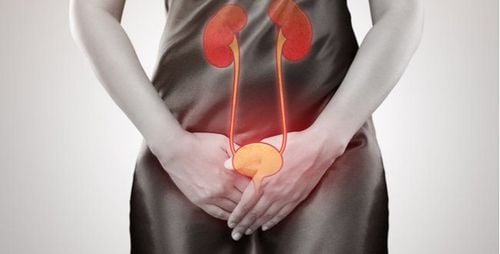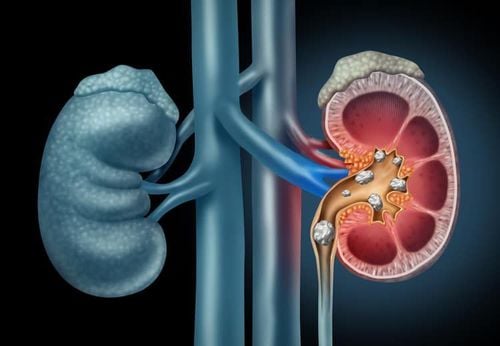Lower abdominal pain and painful urination with blood in women can be warning signs that you have a urinary tract infection. Urinary tract infections in women, if not diagnosed and treated early, can cause many dangerous complications, affecting the quality of daily life and even endangering the patient's life.
1. What is lower abdominal pain and painful urination in women?
There are many causes of this symptom such as urinary tract stones, endometriosis, etc. However, lower abdominal pain and painful urination with blood in women can also be warning signs that you have a urinary tract infection.
Urinary tract infection is an inflammation that occurs in the urinary tract of both men and women. The disease is mainly caused by bacteria, fungi, and urinary stones. Urine is a favorable environmental factor for the growth of bacteria and fungi. When the number of bacteria in the urine reaches a high level, it will cause urinary tract infections.
Other factors that increase the risk of urinary tract infections in women include:
- Women with urinary tract stones, urinary retention due to diabetes, immunodeficiency, etc.
- Having sex with someone with urinary tract infections is also a cause of urinary tract infections in women.
- Women with recurrent cystitis (inflammation of the bladder), narrow urethra, improper hygiene after intercourse or during menstruation, frequent constipation, etc. are also susceptible to urinary tract infections.
- Women in menopause due to changes in female hormones, changes in urine pH, thinner vaginal mucosa, urethra and bladder base, are susceptible to urinary tract infections.

2. Dangerous complications of urinary tract infections in women.
If urinary tract infections in women are not diagnosed and treated early, they can cause many dangerous complications such as:
- Urinary tract infections in women, if not detected, can cause pyelonephritis (kidney infection).
- If urinary tract infections are not treated thoroughly, they can lead to abscesses, blood infections, kidney failure or even death.
- Pregnant women with urinary tract infections can lead to miscarriage, premature birth or malformed children, etc.
- For women, urinary tract infections can cause fallopian tubes obstruction, making it difficult to get pregnant, even infertility.
- People with urinary tract infections always have painful urination, lower abdominal pain and bleeding, so having sex will cause pain and affect their sex life.
- Urinary tract infection is also a warning sign for patients about sexually transmitted diseases such as genital warts, gonorrhea, etc.

3. Symptoms of urinary tract infection
- Painful urination with blood: Painful urination with blood is one of the signs that you have a urinary tract infection. The cause of painful urination with blood in women is the inflamed tissue which is very sensitive and causes a burning sensation when urine passes through it.
- Cloudy urine: Foul-smelling, cloudy urine is one of the symptoms that warn you of a urinary tract infection or urinary stones.
- Frequent urination, urgent urination: due to bacteria coming into contact with the urinary system, inflammatory signals will cause the body to react to the invading bacteria and cause frequent urination.
- Pain in the lower abdomen: Pain in the lower abdomen is an early warning sign of urinary tract infection in women. The cause is the inflammation of the bladder against the infection.
- Incomplete urination: Due to inflammation narrowing the opening of the urethra where urine passes, each time you urinate, you usually only void a small amount.
- Poor bladder control: You will have less control over your bladder during a urinary tract infection. The cause of pain due to inflammation can make the urge to urinate faster.

4. Preventing urinary tract infections in women
Here are some tips to prevent urinary tract infections:
- Women who have had or are having kidney - urinary tract stones must regularly check and screen for urinary tract infections for early treatment, and intervene to remove stones when prescribed by a doctor.
- When having a urinary tract infection, it must be treated properly and thoroughly from the beginning to prevent recurrence.
- Drink enough water: You must drink 2-2.5 liters of water every day to help the kidneys increase urine excretion, increase the expulsion of bacteria, and limit upstream infection to the kidneys causing pyelonephritis.
- Do not hold your urine: Painful urination and lower abdominal pain make you afraid every time you urinate. However, holding your urine will cause urine to stagnate, creating a favorable environment for bacteria to grow.
- Urinate and clean thoroughly after sex to limit bacteria from entering the urinary tract and bladder.
- Change the sanitary pad at least every 4 hours during menstruation or during childbirth to avoid bacteria from moving from the anus to the urethra.
- Clean properly after defecation, you should clean the genital area from front to back, from the vagina to the anus to limit bacteria from the anus coming to the urethra.

- Avoid wearing clothes or underwear that are too tight, or made of materials that do not allow sweat to perspire.. Do not regularly use inappropriate douches.
- Safe sex: You should have safe sex, have monogamous relationships to avoid sexually transmitted diseases (such as gonorrhea, syphilis, etc.); using condoms is a necessary preventive measure in case of unintended sex.
- Balanced diet: You need to combine appropriate diet, supplement foods rich in vitamin C because vitamin C increases the acid level in urine, helping to reduce the number of harmful bacteria; eat lots of green vegetables and fresh fruits.
Please dial HOTLINE for more information or register for an appointment HERE. Download MyVinmec app to make appointments faster and to manage your bookings easily.













